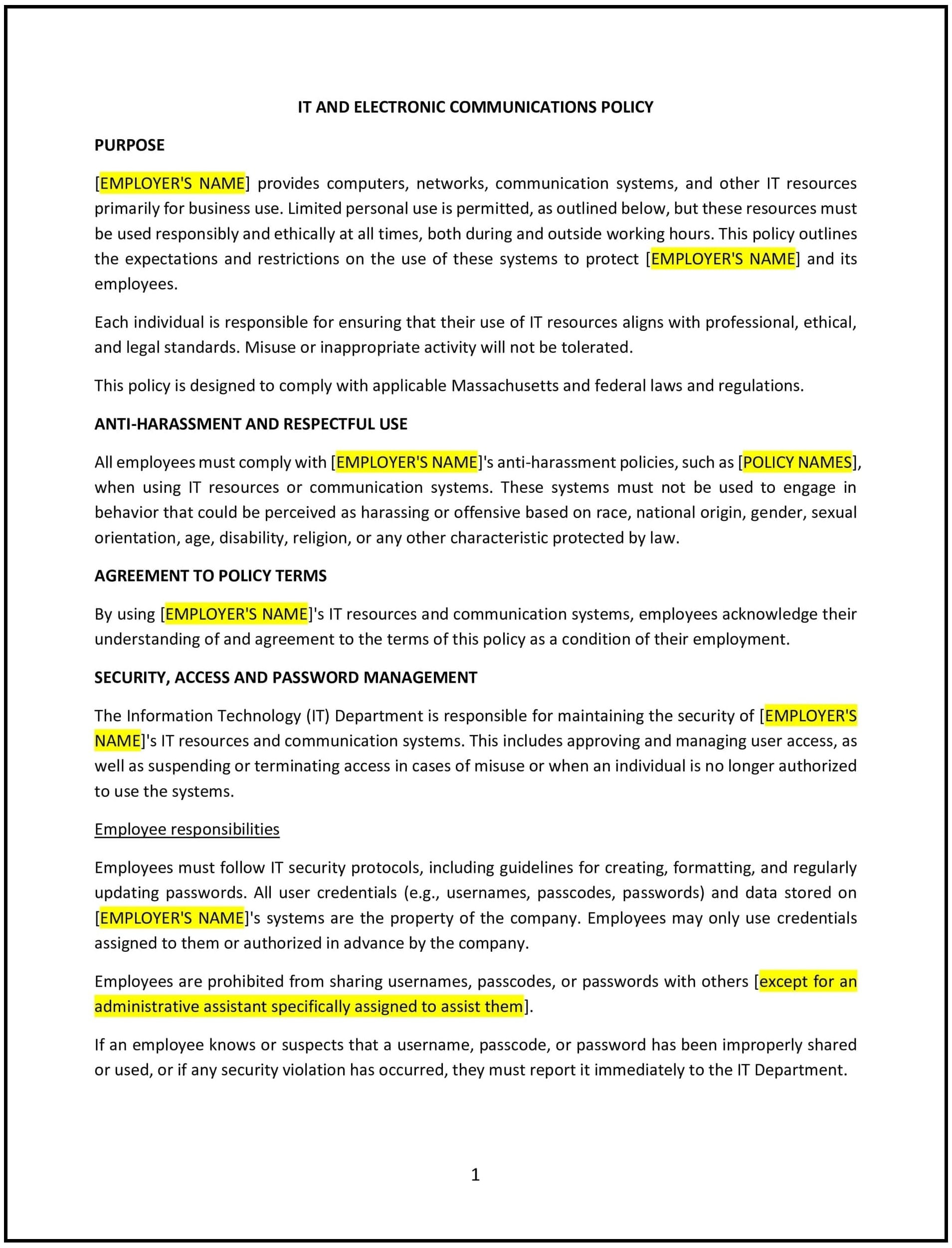IT and electronic communications policy (Massachusetts): Free template
Got contracts to review? While you're here for policies, let Cobrief make contract review effortless—start your free review now.

Customize this template for free
This IT and electronic communications policy is designed to help Massachusetts businesses establish guidelines for the use of technology and electronic communications within the workplace. The policy covers the acceptable use of company-provided IT resources, including computers, mobile devices, email, internet access, and other communication tools. It aims to ensure that employees use company technology responsibly, securely, and in a manner that complies with legal and regulatory standards.
By adopting this policy, businesses can protect their IT infrastructure, maintain data security, and ensure that employees use technology in a way that supports the organization’s goals while minimizing risks related to misuse or data breaches.
How to use this IT and electronic communications policy (Massachusetts)
- Define acceptable use: Specify what constitutes acceptable use of company-provided IT resources, including computers, internet access, email, mobile devices, and other digital communication tools. The policy should outline activities that are prohibited, such as accessing inappropriate websites, downloading unauthorized software, or using company resources for personal gain.
- Establish guidelines for communication: Set clear guidelines for the appropriate use of email, instant messaging, and other communication tools. The policy should emphasize professionalism in all communications and prohibit sending offensive, harassing, or discriminatory content.
- Protect company data: Ensure that employees understand their responsibility for safeguarding company data, including intellectual property, confidential information, and client data. The policy should require employees to use strong passwords, encrypt sensitive data, and report any data breaches or suspicious activities immediately.
- Address personal use of IT resources: Outline the company’s stance on personal use of IT resources, including whether employees are allowed to use company-provided devices for personal activities. The policy should set limits to prevent misuse while acknowledging that limited personal use may be allowed during non-working hours.
- Define security protocols: Specify the security protocols employees must follow, including keeping devices secure, using anti-virus software, and ensuring that sensitive information is not shared or exposed through unsecured networks. The policy should also cover procedures for securing mobile devices and laptops when traveling or working remotely.
- Implement monitoring and auditing: Outline the company’s right to monitor and audit IT systems, emails, and internet usage to ensure compliance with the policy. The policy should be clear about the extent of monitoring and any exceptions, emphasizing the importance of transparency in this area.
- Address violations and consequences: Specify the consequences for violating the IT and electronic communications policy, including disciplinary actions, termination of access to IT resources, or legal action for severe violations. The policy should make it clear that violations may result in immediate corrective actions.
- Ensure compliance with Massachusetts and federal laws: Ensure that the policy complies with Massachusetts state laws, including data protection laws, and federal regulations, such as the Electronic Communications Privacy Act (ECPA) and the Computer Fraud and Abuse Act (CFAA). The policy should align with industry standards for data protection and security.
- Review and update regularly: Periodically review and update the policy to reflect new technologies, changes in business practices, and evolving legal or regulatory requirements.
Benefits of using this IT and electronic communications policy (Massachusetts)
This policy offers several benefits for Massachusetts businesses:
- Protects company data and resources: By setting clear guidelines for the use of IT resources, businesses can protect sensitive data from misuse, unauthorized access, and potential security breaches.
- Promotes legal compliance: The policy promotes compliance with Massachusetts state laws, federal regulations, and industry standards, helping businesses avoid legal liabilities or penalties.
- Improves productivity and professionalism: Clear communication and appropriate use of IT resources improve employee productivity and foster a professional work environment.
- Reduces security risks: By setting standards for security protocols and monitoring usage, businesses can mitigate risks related to data breaches, cyber-attacks, or the exposure of confidential information.
- Enhances employee accountability: The policy establishes clear expectations for employees regarding the responsible use of company technology, promoting accountability and responsible behavior.
- Protects company reputation: A strong IT and electronic communications policy helps prevent reputational damage from inappropriate behavior or security breaches, enhancing the company’s standing with customers, clients, and stakeholders.
Tips for using this IT and electronic communications policy (Massachusetts)
- Communicate the policy clearly: Ensure that all employees are aware of the IT and electronic communications policy and understand their responsibilities regarding acceptable use, data security, and communication standards. Provide training if necessary.
- Provide adequate security resources: Provide employees with the tools and resources they need to adhere to security protocols, including secure email services, encryption tools, and access to IT support.
- Monitor usage appropriately: Regularly monitor IT usage to ensure compliance with the policy, but maintain transparency with employees about the extent of monitoring. Implement auditing procedures to track usage and identify potential violations.
- Educate employees on data security: Ensure that employees are educated on best practices for data security, including how to create strong passwords, recognize phishing attempts, and protect sensitive information from unauthorized access.
- Implement device management protocols: Establish procedures for managing company-issued devices, including setting up security measures, keeping software up to date, and ensuring proper disposal or repurposing of devices when employees leave the company.
- Review and update regularly: Periodically review the policy to ensure it reflects any changes in technology, regulatory requirements, or company operations. Make necessary adjustments based on feedback, audits, or new security threats.